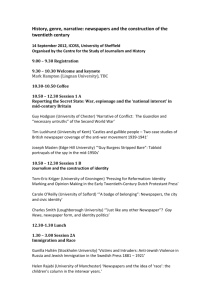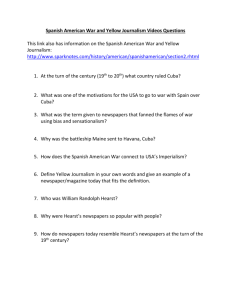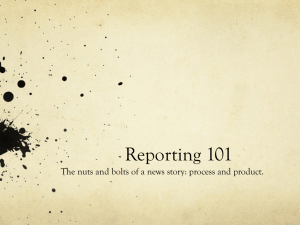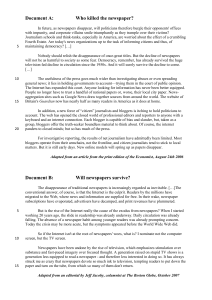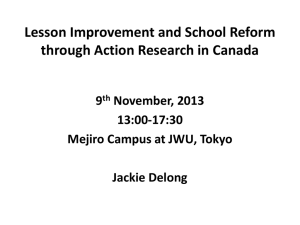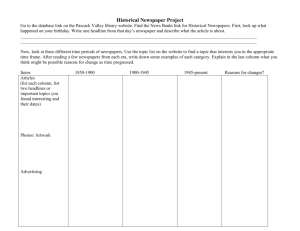Commonwealth inquiry into media regulation
advertisement
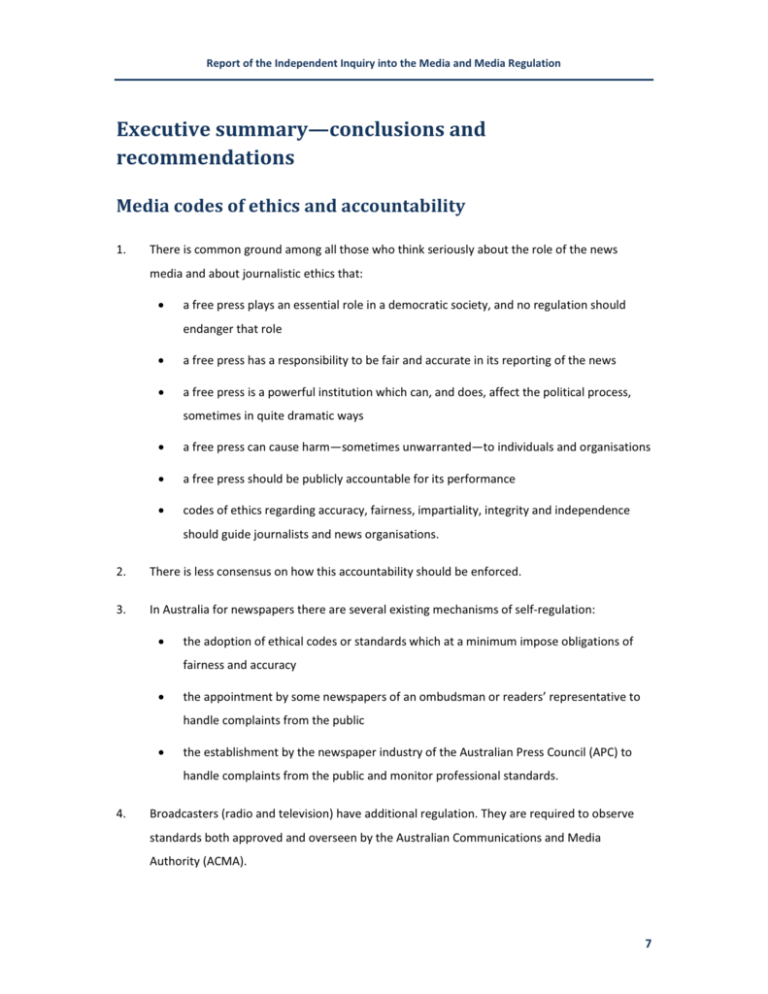
Report of the Independent Inquiry into the Media and Media Regulation Executive summary—conclusions and recommendations Media codes of ethics and accountability 1. There is common ground among all those who think seriously about the role of the news media and about journalistic ethics that: • a free press plays an essential role in a democratic society, and no regulation should endanger that role • a free press has a responsibility to be fair and accurate in its reporting of the news • a free press is a powerful institution which can, and does, affect the political process, sometimes in quite dramatic ways • a free press can cause harm—sometimes unwarranted—to individuals and organisations • a free press should be publicly accountable for its performance • codes of ethics regarding accuracy, fairness, impartiality, integrity and independence should guide journalists and news organisations. 2. There is less consensus on how this accountability should be enforced. 3. In Australia for newspapers there are several existing mechanisms of self-regulation: • the adoption of ethical codes or standards which at a minimum impose obligations of fairness and accuracy • the appointment by some newspapers of an ombudsman or readers’ representative to handle complaints from the public • the establishment by the newspaper industry of the Australian Press Council (APC) to handle complaints from the public and monitor professional standards. 4. Broadcasters (radio and television) have additional regulation. They are required to observe standards both approved and overseen by the Australian Communications and Media Authority (ACMA). 7 Report of the Independent Inquiry into the Media and Media Regulation 5. There is, however, external regulation which applies to all news media. They must operate within the laws of the land, most importantly for the media, the laws of defamation and contempt. 6. I have come to the conclusion that these mechanisms are not sufficient to achieve the degree of accountability desirable in a democracy: • Of the existing self-regulation measures, only one or two newspapers have appointed an ombudsman or readers’ representative. • Online news publications are not covered. • The most important institution, the APC, suffers from serious structural constraints. It does not have the necessary powers or the required funds to carry out its designated functions. Publishers can withdraw when they wish and alter their funding as they see fit. • ACMA’s processes are cumbersome and slow. • If legal proceedings against the media are called for, they are protracted, expensive and adversarial, and offer redress only for legal wrongs, not for the more frequent complaints about inaccuracy or unfairness. 7. The problems with both the external and self-regulatory mechanisms are inherent, and cannot be easily remedied by piecemeal measures. 8. I therefore recommend that a new body, a News Media Council, be established to set journalistic standards for the news media in consultation with the industry, and handle complaints made by the public when those standards are breached. Those standards will likely be substantially the same as those that presently apply and which all profess to embrace. 9. Moreover, I recommend that the News Media Council have those roles in respect of news and current affairs coverage on all platforms, that is, print, online, radio and television. It will thus explicitly cover online news for the first time, and will involve transferring ACMA functions for standards and complaints concerning news and current affairs. It will replace the voluntary APC with a statutory entity. In an era of media convergence, the mandate of regulatory agencies should be defined by function rather than by medium. Where many publishers 8 Report of the Independent Inquiry into the Media and Media Regulation transmit the same story on different platforms it is logical that there be one regulatory regime covering them all. 10. The News Media Council should have secure funding from government and its decisions made binding, but beyond that government should have no role. The establishment of a council is not about increasing the power of government or about imposing some form of censorship. It is about making the news media more accountable to those covered in the news, and to the public generally. 11. A guiding principle behind the design of the News Media Council is that it will provide redress in ways that are consistent with the nature of journalism and its democratic role. Like the APC, its members should be comprised of community, industry and professional representatives. It should adopt complaint-handling procedures which are timely, efficient and inexpensive. In the first instance it should seek to resolve a complaint by conciliation and do so within two or three days. If a complaint must go to adjudication it should be resolved within weeks, not months. 12. An important change to the status quo is that, in appropriate cases, the News Media Council should have power to require a news media outlet to publish an apology, correction or retraction, or afford a person a right to reply. This is in line with the ideals contained in existing ethical codes but in practice often difficult to obtain. 13. If these recommendations are adopted, both the public and news media organisations should be confident that the News Media Council will carry out its functions independently and effectively. There will be a single, properly-funded regulator with the power to enforce news standards across all news media outlets. 14. Although I recommend that these steps be taken to make the news media properly accountable, there is another side to the media that ought to be acknowledged. Despite the volume of complaints and criticisms, what also became apparent to me during the course of the Inquiry is the news media’s many achievements, and just how strongly many people, both inside and outside the media, care about the health of news and journalism. Australia’s newspapers employ many dedicated professionals, performing their roles skilfully and diligently. The process of accountability proposed here recognises the realities and difficulties of journalism, emphasising immediate exchange and correction rather than financial or legal 9 Report of the Independent Inquiry into the Media and Media Regulation punitiveness. Equally it is consistent with the ideals guiding journalism by emphasising transparency and recognising the public interest in how a major institution of our democracy performs. 15. These proposals are made at a time when polls consistently reveal low levels of trust in the media, when there is declining newspaper circulation, and when there are frequent controversies about media performance. Many of the criticisms are self-interested or expedient; much of the public cynicism is misdirected. Yet a news media visibly living up to its own standards and enforcing its own high ideals is likely to increase rather than undermine public confidence and acceptance. Changing business models and quality journalism 16. New technology, particularly the internet, has revolutionised access to the news. The result has been a reduction in the circulation of newspapers and a reduction in revenue from classified advertising. The advertising expenditure is now spread across platforms. Main news organisations are recovering only a small proportion of these revenues by moving to online publishing. 17. These changes have been greeted with dramatic rhetoric: Who killed the newspaper? asked The Economist magazine in 2006 1. In the United States, the crisis has been felt by the news media much more acutely, and there has been considerable pessimism about the news media being able to continue their traditional democratic roles. 18. It is too early to reach such conclusions in Australia. We are in the midst of changes whose future direction can only dimly be discerned. Moreover there are many positive as well as negative changes with the increasing importance of the internet. Low barriers to entry will facilitate new ventures, and so may lead to more democratic diversity, given the concentrated ownership of Australian newspapers. 19. 1 I have reached the conclusion that at this stage there is not a case for government support. ‘Who killed the newspaper?’ The Economist (London) 26 August 2006, 9. 10 Report of the Independent Inquiry into the Media and Media Regulation 20. Nevertheless, the situation is changing rapidly, and requires careful and continuous monitoring. Therefore, I recommend that one function of a News Media Council should be to chart trends in the industry, and particularly to see whether there will be a serious decline in the production and delivery of quality journalism. 21. In addition, I recommend that within the next two years or so the Productivity Commission be issued with a reference to conduct an inquiry into the health of the news industry and make recommendations on whether there is a need for government support to sustain that role. It should also consider the policy principles by which any government support should be given to ensure effectiveness, as well as eliminating any chance of political patronage or censorship. 22. Apart from reviewing those issues on a national scale, one area that requires especially careful monitoring is the adequacy of news services in regional areas. There is some evidence that both regional radio and television stations and newspapers have cut back substantially on their news gathering, leaving some communities poorly served for local news. This may require particular support in the immediate future, and I recommend that this issue be investigated by the government as a matter of some urgency. 11


